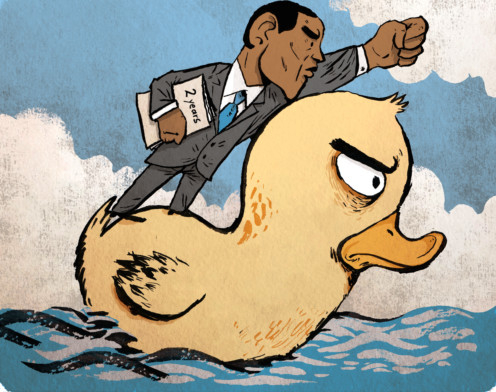
The US Congress has adjourned in advance of the November 4 elections, which will shape the course of US and international politics in coming years. All eyes are on the US Senate, which Democrats have controlled since 2007, but which Republicans currently have a greater than evens prospect of winning back.
With Republicans already strong favourites to retain a majority in the US House of Representatives in November, Democratic President Barack Obama could face his partisan opponents holding both chambers of Congress in his final two years of office. However, while this would stymie much of the remainder of his domestic policy agenda, it need not leave him as a complete ‘lame duck’ president — as some already contend.
Instead, it would probably accentuate his focus on foreign policy in 2015 and 2016. Here, he could still secure significant achievements to consolidate his presidential legacy.
On the defence and security fronts, this includes the prospect of a significant depletion of Daesh’s (Islamic State of Iraq and the Levant) territorial foothold and capabilities in Iraq and Syria. And also stabilising the new national unity government in Afghanistan, headed by new President Ashraf Gani and his CEO Abdullah Abdullah, which earlier this month concluded a new security treaty that will see a continuing significant US and Nato presence in the country beyond this December.
There is also the possibility of a comprehensive, permanent nuclear agreement with Iran, which would help consolidate Obama’s broader desire to enhance global nuclear security. As well as inter-state nuclear diplomacy, the US administration has created the Nuclear Security Summit process to counter nuclear terrorism, which Obama has described as the “most immediate and extreme threat to global security”.
And on the trade policy front, the White House is negotiating for the Trans-Pacific Partnership with around a dozen countries in the Americas and Asia-Pacific that collectively account for about 40 per cent of the world’s gross domestic product (GDP). This free trade and investment treaty is one key element of Obama’s ambition for a reorientation of US international policy towards the Asia-Pacific region and other strategic high-growth markets.
Moreover, Obama also wants to secure the Transatlantic Trade and Investment Partnership with the 28 European Union states. This would represent the largest regional free trade and investment agreement in history with the US and Europe accounting for more than 50 per cent of the world’s GDP.
The fact that Obama’s presidency would still have foreign policy potency, even in the event of a Republican Congress, is underscored by the fact that several of his two-term predecessors have secured significant international achievements in the twilight years of their presidencies. For instance, the last Democratic president, Bill Clinton, who, in his last two years of office in 1999 and 2000, faced a wholly-Republican Congress, won landmark congressional approval in October 2000 for so-called Permanent Normal Trade Relations with China.
This is the status given to key US trading partners, which are eligible to receive low tariffs and other concessions in exchange for similar benefits. This important legislative victory, alongside subsequent US international diplomacy, set the stage for Beijing to join the World Trade Organisation about a year afterwards.
Clinton was also commander-in-chief of US forces during the several-month long Nato bombing campaign in Kosovo in 1999. This military action, in concert with diplomacy with Russia, created the pathway that led to Yugoslav president Slobodan Milosevic losing power in 2000.
The presidency of Ronald Reagan also underlines the potential for significant foreign policy achievements in the final years of office. Reagan, who faced a Democrat-controlled Senate and House of Representatives, secured a number of significant international achievements in 1987 and 1988 that helped bring an end to the Cold War with the Soviet Union. In particular, he held two key summits with Mikhail Gorbachev in Washington in 1987, where the Intermediate-Range Nuclear Forces Treaty was signed, and Moscow in 1988. And in November 1989, only 10 months after Reagan left office, the Berlin Wall came down paving the way for the collapse of Soviet Communism.
Taken overall, Obama will therefore not become a complete lame duck president if Republicans win control of both chambers of Congress in November. Instead, his focus on foreign policy will probably intensify further in 2015 and 2016 where he could still secure significant achievements on the defence, security and trade fronts to bolster his presidential legacy.
Andrew Hammond is an Associate at LSE Ideas at the London School of Economics and a former US editor at Oxford Analytica. He was formerly a special adviser in the UK Government.










